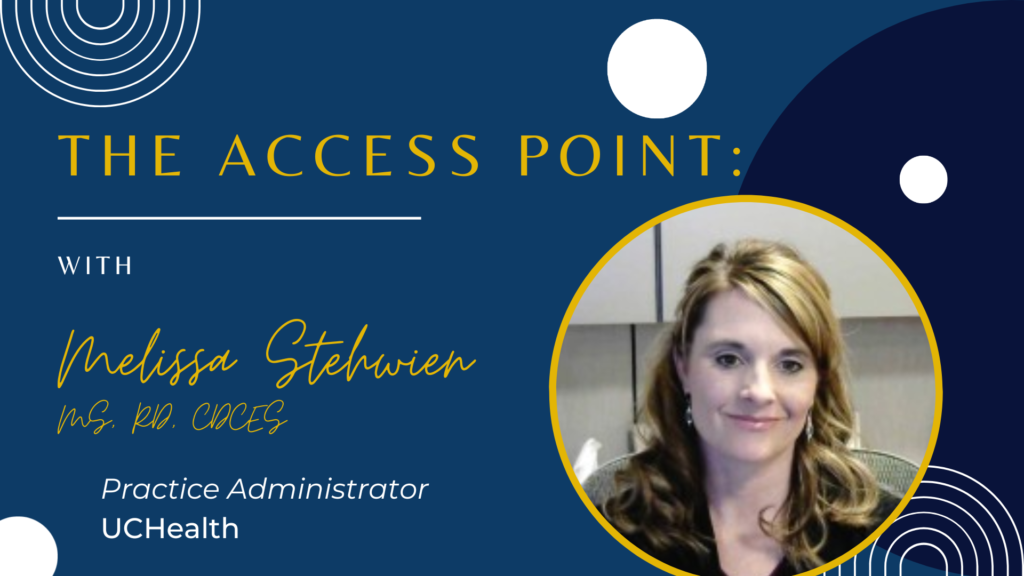The Patient Access Excellence program taking place Tuesday, November 12th, will feature a case study delivered by members of the team at UCHealth on their transition to a comprehensive, centralized scheduling model. Melissa Stehwien, Practice Administrator at UCHealth will participate in the discussion, sharing her experiences and lessons learned. We had a moment to sit down with Melissa ahead of the meeting to learn more about her own professional journey, as well as getting a sneak peak into what she and the team will be discussing during the case study, and how Hummingbird Healthcare helped smooth the runway for this dynamic team, enabling them to achieve goals that are meeting patient, provider, and staff needs.
Tell us about your professional background; how did you get your start in the healthcare industry, and what motivates you to work in this dynamic and crucial industry?
I began my career as an inpatient dietitian, gradually shifting into an outpatient role as a Certified Diabetes Educator. There was a great deal of enjoyment working with patients with chronic diseases, helping them to navigate and successfully manage diseases and reduce complications. After five years of providing diabetes education, I became the program coordinator of the department, and really enjoyed the leadership experience and role.
A relocation nearly a decade later resulted in a new position in Cheyenne, WY, where I was the Endocrinology practice manager as well as diabetes education program coordinator. At the time, I was seeing fewer patients in the clinic as the responsibilities of the position continued to grow. Throughout, I truly enjoyed the leadership position, working with providers and staff to provide excellent care by ensuring the right resources were in place. Additional clinics were added to my leadership portfolio, and at that time, I stopped providing diabetes education directly to patients, instead managing Internal Medicine, Pulmonary, and Endocrinology clinics.
In 2021, I joined UCHealth as an operations manager for Endocrinology and Rheumatology clinics. Learning about rheumatology practices and the nuances of care has been a fulfilling challenge, and in 2022, I was promoted to the Practice Administrator for Medical Specialties at UCHealth, where I am currently responsible for the medical group clinics of Endocrinology, Rheumatology, Dermatology, Pulmonology, Gastroenterology, Breast Surgery, Oncology, and GYN Oncology throughout the States of Colorado and Wyoming.
The constant change and challenges motivate me to work in this dynamic and crucial industry. Healthcare constantly evolves, and we must keep up with it to provide excellent patient care. I enjoy helping leaders, providers, and staff attain their goals to succeed as an operation.
You’ll be sharing a case study during the upcoming meeting where you’ll talk about how the UCHealth transformed scheduling into a comprehensive, centralized scheduling model. Could you share what prompted the team to start the transition to a centralized model?
Our internal teams were struggling to keep up with the details required to succeed in the administrative and receptionist roles, and we were also facing a degree of staff turnover in certain reception areas, making it difficult for existing staff to work short-handedly and at the same time train new members of the team. On top of this, our call volumes and wait times were increasing to unacceptable levels, resulting in answering calls with patients that were angry and frustrated about wait times. It was an intolerable model for not only patients, but also our staff and providers on the front lines.
What was one of the hurdles you overcame during this transitional phase?
The biggest hurdle was managing up the new processes for staff and providers as we worked through the development stage. There was a lot of fear and anxiety about the changes that would be made, and how they would impact the teams. Ultimately, these fears were put to rest as integrated scheduling has worked phenomenally for our teams.
Has anything surprised you, or have there been unexpected bonuses from having a comprehensive scheduling model?
The benefits of the patient line refill center have been amazing. This results in fewer in-basket items for clinic staff and providers; an unexpected area that is providing such great relief.
Our headliner sponsor, Hummingbird Healthcare, is an organization that works closely with UCHealth. Could you share one positive aspect of working with them?
Hummingbird Healthcare played a key role in our shift to integrated scheduling. Their team was able to bridge the groups within UCHealth to ensure that everyone had a voice at the table, and could have a system that would work for them. The planning that went into this program was substantial, and we had only a few, very minor, hiccups once live, and I attribute this to the thoughtful and comprehensive planning that took place.
Thank you Melissa, for sharing your journey with us, and for contributing to the upcoming discussion!
For additional information on the agenda for the meeting, check out the full details here.

